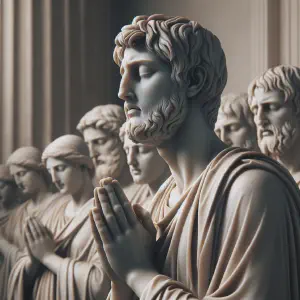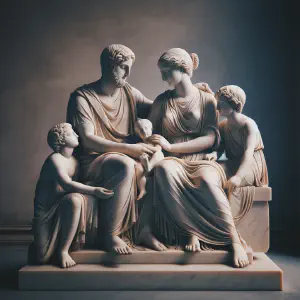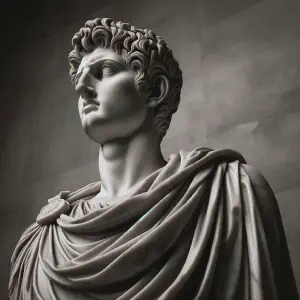The Quest for Understanding
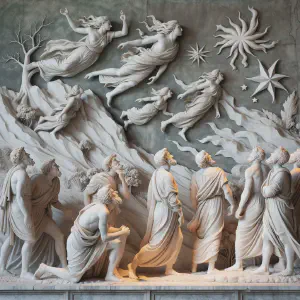
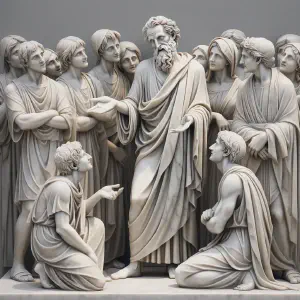
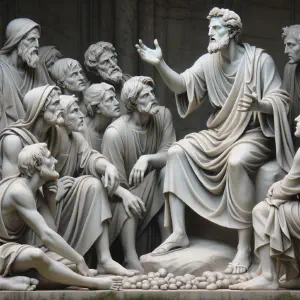
As the traveler departed, the villagers were left in contemplation. They realized that their search for the divine had been focused on the creations, not the Creator. The beauty of the world was a path to understanding, not the destination. They began to see their surroundings as symbols of a greater truth, a truth that spoke of a Creator who was much more than the sum of His creations. In their newfound wisdom, they understood that true faith lay in seeking the Lord behind the marvels of the world, and in this pursuit, they found a deeper, more profound connection with the divine.
Five Questions
What does the story of the villagers worshiping natural elements tell us about human nature and our understanding of God?
The story reflects a fundamental aspect of human nature – our innate desire to understand and connect with something greater than ourselves. The villagers, in their reverence of natural elements like fire and wind, embody a primal recognition of the divine in the world around them. However, this also highlights a common limitation in human understanding: mistaking the creation for the Creator. It’s a reminder that our journey towards comprehending God requires looking beyond the tangible and seeking the deeper, spiritual truth that lies beneath.
How does the sage in the story help the villagers in their spiritual journey?
The sage plays a crucial role in guiding the villagers towards a more profound understanding of God. By encouraging them to look beyond the immediate beauty and power of nature, he redirects their focus from the creation to the Creator. His teachings resonate with the concept of natural theology, which suggests that one can come to know God through observing the natural world. The sage’s wisdom helps the villagers realize that the awe they feel for the elements can lead them to a greater awe for God, who is the source of all beauty and power.
Can you draw a parallel between the teachings of the sage and the message of the Psalms and the Gospel readings?
Absolutely. The sage’s message in the story aligns closely with the themes in the Psalm and the Gospel readings. Psalm 19 speaks of the heavens declaring the glory of God, emphasizing that the natural world is a testament to the Creator’s magnificence. Similarly, the sage points the villagers to this truth. The Gospel readings, particularly the references to the days of Noah and Lot, serve as reminders of the suddenness of God’s intervention and the necessity of spiritual readiness, much like how the sage alerts the villagers to look beyond the surface to understand God’s true nature.
How do the readings from Luke reflect on the themes of preparedness and awareness in spiritual life?
The readings from Luke, particularly the accounts of Noah and Lot, emphasize the sudden and transformative nature of God’s intervention in human affairs. Just as life was proceeding ordinarily in the days of Noah and Lot until drastic changes occurred, the readings suggest that our spiritual life requires constant vigilance and preparedness. They teach us that being spiritually aware means not getting too absorbed in the mundane aspects of life but being ready for when God reveals Himself or calls us to action. This awareness is crucial for a deeper understanding and relationship with God.
What is the overall spiritual lesson that can be drawn from these scriptures and the story?
The overarching spiritual lesson is the call to deepen our understanding of God and recognize His presence in all aspects of life. It teaches us to look beyond the physical and the immediate, to seek the Creator behind the creation. These scriptures and the story urge us to contemplate the divine in everyday life and understand that the beauty, power, and order we observe in the world point us towards a greater, omnipotent Creator. This journey of understanding is not just intellectual but deeply spiritual, guiding us towards a more profound and authentic faith.
Bible Study
Wisdom 13:1-9
All men were by nature foolish who were in ignorance of God,
and who from the good things seen did not succeed in knowing him who is,
and from studying the works did not discern the artisan;
But either fire, or wind, or the swift air,
or the circuit of the stars, or the mighty water,
or the luminaries of heaven, the governors of the world, they considered gods.
Now if out of joy in their beauty they thought them gods,
let them know how far more excellent is the Lord than these;
for the original source of beauty fashioned them.
Or if they were struck by their might and energy,
let them from these things realize how much more powerful is he who made them.
For from the greatness and the beauty of created things
their original author, by analogy, is seen.
But yet, for these the blame is less;
For they indeed have gone astray perhaps,
though they seek God and wish to find him.
For they search busily among his works,
but are distracted by what they see, because the things seen are fair.
But again, not even these are pardonable.
For if they so far succeeded in knowledge
that they could speculate about the world,
how did they not more quickly find its Lord?
This passage criticizes those who, despite observing the beauty and grandeur of nature, fail to recognize God as the ultimate creator. It underlines a key theological concept in Catholicism - natural revelation, where nature acts as a testament to God’s existence and power. This aligns with the Catholic values of acknowledging God’s omnipotence and the duty to seek truth about God through His creation, as emphasized in the Catechism of the Catholic Church. It indirectly supports the First Commandment, urging recognition of the one true God over idolatry.
Psalm 19:2-5ab
R. (2a) The heavens proclaim the glory of God.
The heavens declare the glory of God,
and the firmament proclaims his handiwork.
Day pours out the word to day,
and night to night imparts knowledge.
R. The heavens proclaim the glory of God.
Not a word nor a discourse
whose voice is not heard;
Through all the earth their voice resounds,
and to the ends of the world, their message.
R. The heavens proclaim the glory of God.
Authored traditionally by King David, a central figure in both Jewish and Christian traditions, this Psalm celebrates the glory of God as revealed through the natural world. The firmament and the changing days manifest God’s handiwork, promoting the Catholic value of recognizing divine presence in everyday life. This Psalm complements the teachings of the Catechism on God’s continuous revelation and the duty of humans to acknowledge and praise God. It upholds the idea of general revelation, consistent with Catholic teachings on finding God in all aspects of creation.
Luke 17:26-37
Jesus said to his disciples:
“As it was in the days of Noah,
so it will be in the days of the Son of Man;
they were eating and drinking,
marrying and giving in marriage up to the day
that Noah entered the ark,
and the flood came and destroyed them all.
Similarly, as it was in the days of Lot:
they were eating, drinking, buying,
selling, planting, building;
on the day when Lot left Sodom,
fire and brimstone rained from the sky to destroy them all.
So it will be on the day the Son of Man is revealed.
On that day, someone who is on the housetop
and whose belongings are in the house
must not go down to get them,
and likewise one in the field
must not return to what was left behind.
Remember the wife of Lot.
Whoever seeks to preserve his life will lose it,
but whoever loses it will save it.
I tell you, on that night there will be two people in one bed;
one will be taken, the other left.
And there will be two women grinding meal together;
one will be taken, the other left.”
They said to him in reply, “Where, Lord?”
He said to them, “Where the body is,
there also the vultures will gather.”
This passage, part of the Gospel of Luke, attributed to Luke the Evangelist, a physician and companion of Apostle Paul, draws parallels between the days of Noah and Lot and the coming of the Son of Man (Jesus). It emphasizes the need for vigilance and preparedness for God’s judgment, resonating with Catholic teachings on the Last Things (death, judgment, heaven, and hell). The reference to Lot’s wife, who looked back at Sodom, underscores the importance of detachment from worldly matters, aligning with Catholic values of placing God above all earthly concerns. It also reflects on the nature of divine grace, which requires active acceptance and readiness.
Lessons
These passages collectively teach us the importance of discerning the Creator behind the creation. They remind us that the beauty and power of the natural world are reflections of a greater divine source. The stories of Noah and Lot serve as examples of how ordinary life can be transformed by God’s intervention, emphasizing the need for preparedness and faith in God’s plan. They encourage us to seek deeper understanding and wisdom, not just in the marvels of the world, but in the divine truth and revelation they signify. Through these lessons, we are called to strengthen our faith and acknowledge the omnipresence and omnipotence of God in every aspect of our lives.
Meditation Prayer
